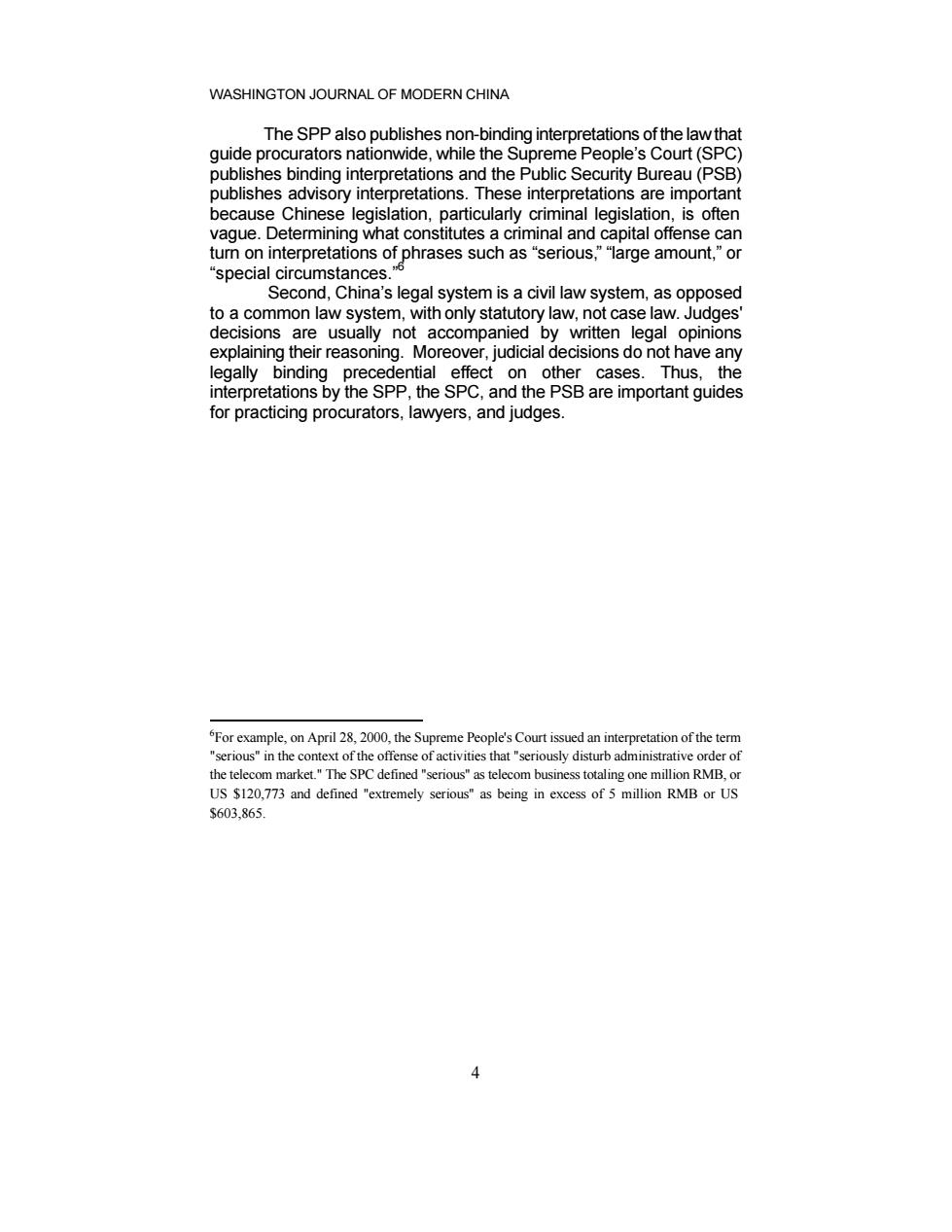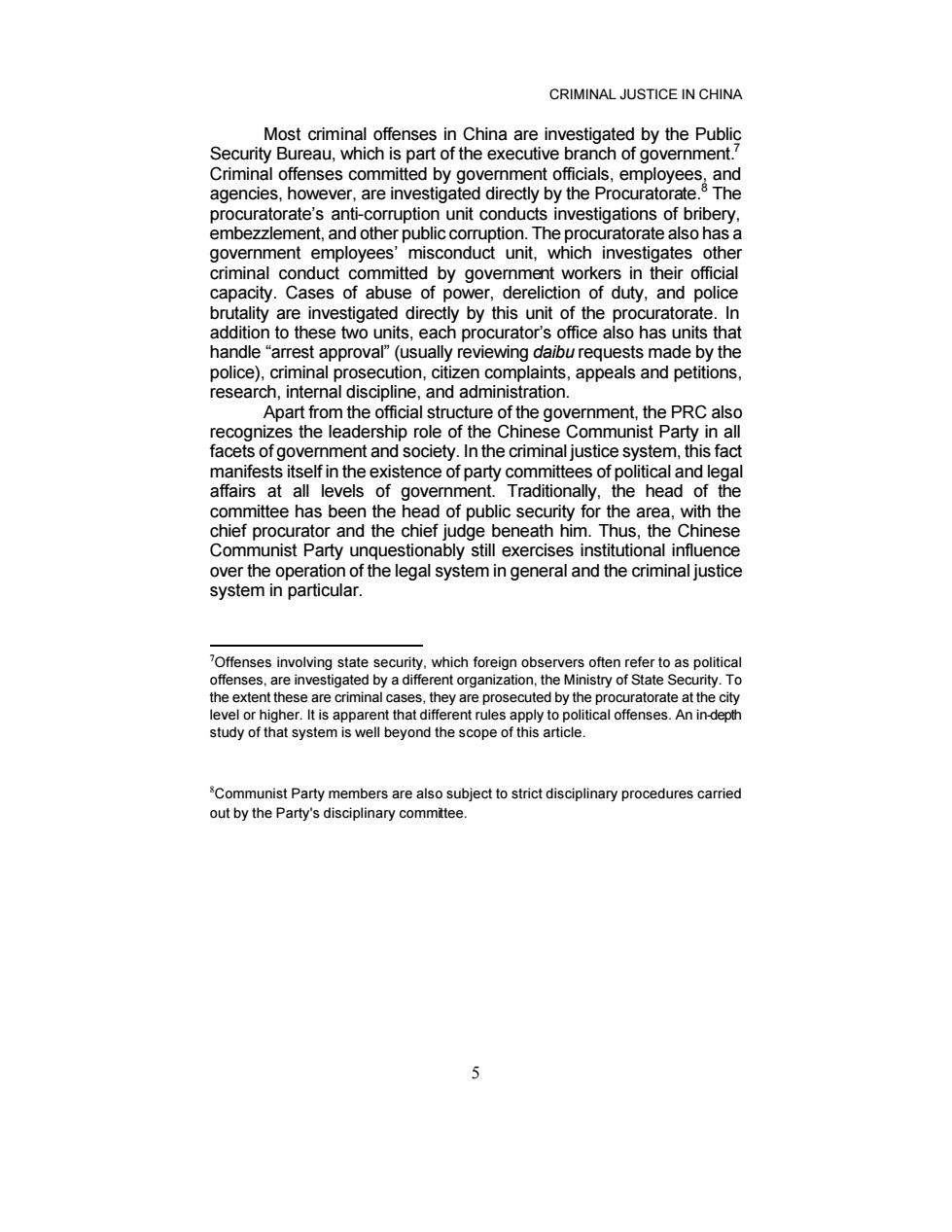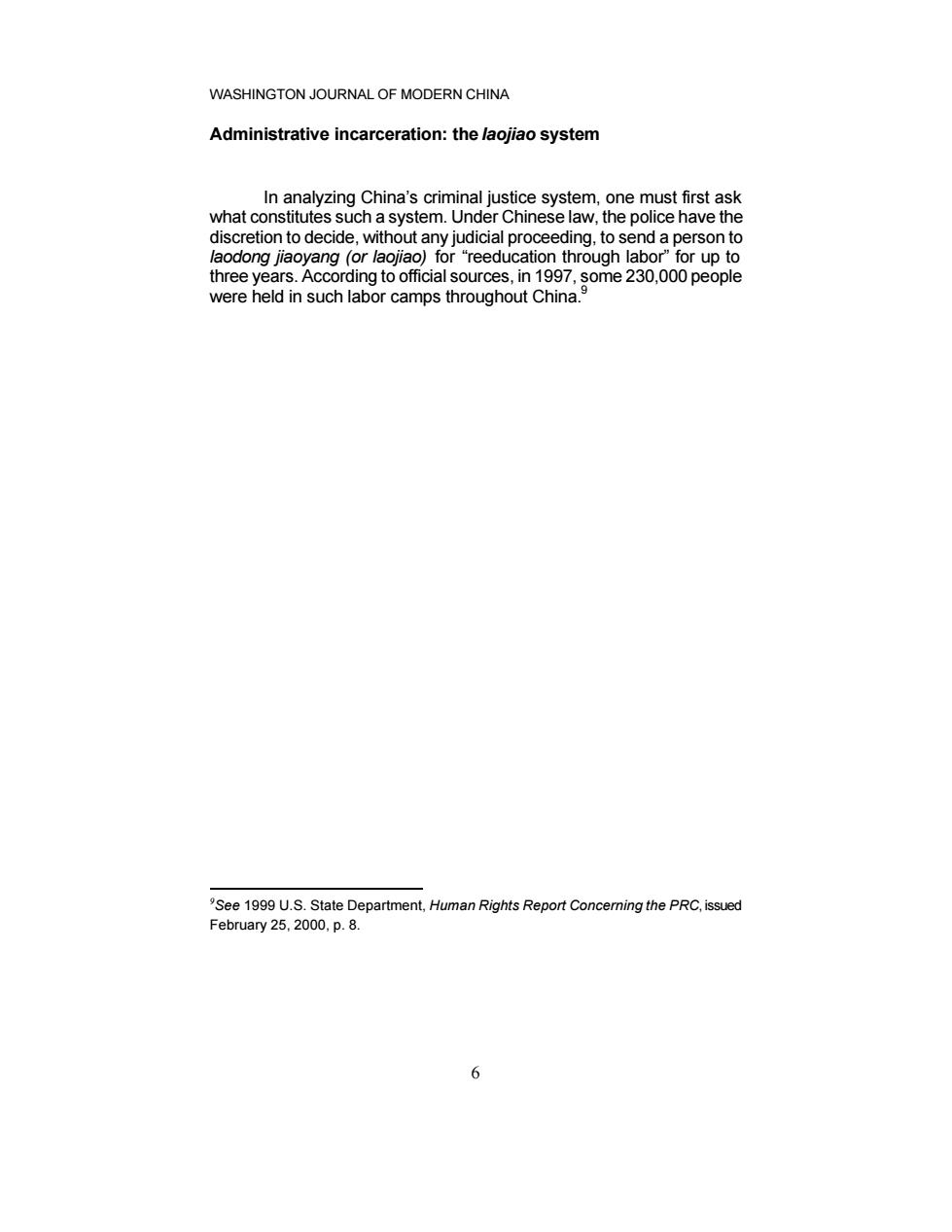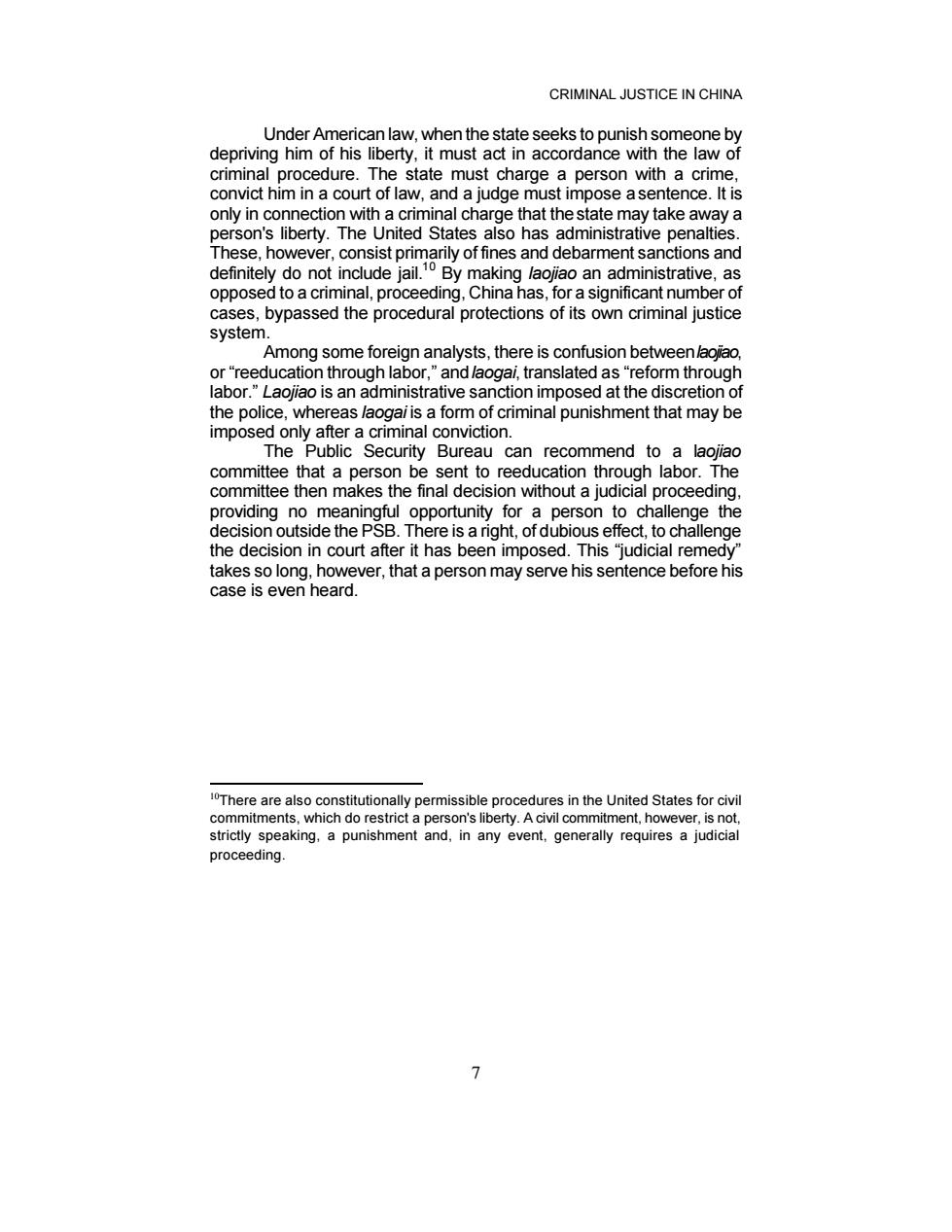
WASHINGTON JOURNAL OF MODERN CHINA The SPP also publishes non-binding interpretations of the law that guide procurators nationwide,while the Supreme People's Court(SPC) publishes binding interpretations and the Public Security Bureau(PSB) publishes advisory interpretations.These interpretations are important because Chinese legislation,particularly criminal legislation,is often vague.Determining what constitutes a criminal and capital offense can turn on interpretations of phrases such as"serious,""large amount,"or special circumstances."6 Second,China's legal system is a civil law system,as opposed to a common law system,with only statutory law,not case law.Judges decisions are usually not accompanied by written legal opinions explaining their reasoning.Moreover,judicial decisions do not have any legally binding precedential effect on other cases.Thus,the interpretations by the SPP,the SPC,and the PSB are important guides for practicing procurators,lawyers,and judges. For example,on April 28,2000,the Supreme People's Court issued an interpretation of the term "serious"in the context of the offense of activities that "seriously disturb administrative order of the telecom market."The SPC defined "serious"as telecom business totaling one million RMB,or US $120,773 and defined "extremely serious"as being in excess of 5 million RMB or US $603,865. 4
WASHINGTON JOURNAL OF MODERN CHINA 4 The SPP also publishes non-binding interpretations of the law that guide procurators nationwide, while the Supreme People’s Court (SPC) publishes binding interpretations and the Public Security Bureau (PSB) publishes advisory interpretations. These interpretations are important because Chinese legislation, particularly criminal legislation, is often vague. Determining what constitutes a criminal and capital offense can turn on interpretations of phrases such as “serious,” “large amount,” or “special circumstances.”6 Second, China’s legal system is a civil law system, as opposed to a common law system, with only statutory law, not case law. Judges' decisions are usually not accompanied by written legal opinions explaining their reasoning. Moreover, judicial decisions do not have any legally binding precedential effect on other cases. Thus, the interpretations by the SPP, the SPC, and the PSB are important guides for practicing procurators, lawyers, and judges. 6For example, on April 28, 2000, the Supreme People's Court issued an interpretation of the term "serious" in the context of the offense of activities that "seriously disturb administrative order of the telecom market." The SPC defined "serious" as telecom business totaling one million RMB, or US $120,773 and defined "extremely serious" as being in excess of 5 million RMB or US $603,865

CRIMINAL JUSTICE IN CHINA Most criminal offenses in China are investigated by the Public Security Bureau,which is part of the executive branch of government.' Criminal offenses committed by government officials,employees,and agencies,however,are investigated directly by the Procuratorate.The procuratorate's anti-corruption unit conducts investigations of bribery, embezzlement,and other public corruption.The procuratorate also has a government employees'misconduct unit,which investigates other criminal conduct committed by government workers in their official capacity.Cases of abuse of power,dereliction of duty,and police brutality are investigated directly by this unit of the procuratorate.In addition to these two units,each procurator's office also has units that handle"arrest approval"(usually reviewing daibu requests made by the police),criminal prosecution,citizen complaints,appeals and petitions, research,internal discipline,and administration. Apart from the official structure of the government,the PRC also recognizes the leadership role of the Chinese Communist Party in all facets of government and society.In the criminal justice system,this fact manifests itself in the existence of party committees of political and legal affairs at all levels of government.Traditionally,the head of the committee has been the head of public security for the area,with the chief procurator and the chief judge beneath him.Thus,the Chinese Communist Party unquestionably still exercises institutional influence over the operation of the legal system in general and the criminal justice system in particular. "Offenses involving state security,which foreign observers often refer to as political offenses,are investigated by a different organization,the Ministry of State Security.To the extent these are criminal cases,they are prosecuted by the procuratorate at the city level or higher.It is apparent that different rules apply to political offenses.An in-depth study of that system is well beyond the scope of this article. Communist Party members are also subject to strict disciplinary procedures carried out by the Party's disciplinary committee 5
CRIMINAL JUSTICE IN CHINA 5 Most criminal offenses in China are investigated by the Public Security Bureau, which is part of the executive branch of government.7 Criminal offenses committed by government officials, employees, and agencies, however, are investigated directly by the Procuratorate.8 The procuratorate’s anti-corruption unit conducts investigations of bribery, embezzlement, and other public corruption. The procuratorate also has a government employees’ misconduct unit, which investigates other criminal conduct committed by government workers in their official capacity. Cases of abuse of power, dereliction of duty, and police brutality are investigated directly by this unit of the procuratorate. In addition to these two units, each procurator’s office also has units that handle “arrest approval” (usually reviewing daibu requests made by the police), criminal prosecution, citizen complaints, appeals and petitions, research, internal discipline, and administration. Apart from the official structure of the government, the PRC also recognizes the leadership role of the Chinese Communist Party in all facets of government and society. In the criminal justice system, this fact manifests itself in the existence of party committees of political and legal affairs at all levels of government. Traditionally, the head of the committee has been the head of public security for the area, with the chief procurator and the chief judge beneath him. Thus, the Chinese Communist Party unquestionably still exercises institutional influence over the operation of the legal system in general and the criminal justice system in particular. 7Offenses involving state security, which foreign observers often refer to as political offenses, are investigated by a different organization, the Ministry of State Security. To the extent these are criminal cases, they are prosecuted by the procuratorate at the city level or higher. It is apparent that different rules apply to political offenses. An in-depth study of that system is well beyond the scope of this article. 8Communist Party members are also subject to strict disciplinary procedures carried out by the Party's disciplinary committee

WASHINGTON JOURNAL OF MODERN CHINA Administrative incarceration:the laojiao system In analyzing China's criminal justice system,one must first ask what constitutes such a system.Under Chinese law,the police have the discretion to decide,without any judicial proceeding,to send a person to laodong jiaoyang(or laojiao)for "reeducation through labor"for up to three years.According to official sources,in 1997,some 230,000 people were held in such labor camps throughout China. See 1999 U.S.State Department,Human Rights Report Concerning the PRC,issued February 25,2000,p.8. 6
WASHINGTON JOURNAL OF MODERN CHINA 6 Administrative incarceration: the laojiao system In analyzing China’s criminal justice system, one must first ask what constitutes such a system. Under Chinese law, the police have the discretion to decide, without any judicial proceeding, to send a person to laodong jiaoyang (or laojiao) for “reeducation through labor” for up to three years. According to official sources, in 1997, some 230,000 people were held in such labor camps throughout China.9 9See 1999 U.S. State Department, Human Rights Report Concerning the PRC, issued February 25, 2000, p. 8

CRIMINAL JUSTICE IN CHINA Under American law,when the state seeks to punish someone by depriving him of his liberty,it must act in accordance with the law of criminal procedure.The state must charge a person with a crime, convict him in a court of law,and a judge must impose a sentence.It is only in connection with a criminal charge that the state may take away a person's liberty.The United States also has administrative penalties. These,however,consist primarily of fines and debarment sanctions and definitely do not include jail.By making laojiao an administrative,as opposed to a criminal,proceeding,China has,for a significant number of cases,bypassed the procedural protections of its own criminal justice system. Among some foreign analysts,there is confusion betweenlaoiao, or"reeducation through labor,"and /aogai,translated as"reform through labor."Laojiao is an administrative sanction imposed at the discretion of the police,whereas /aogai is a form of criminal punishment that may be imposed only after a criminal conviction. The Public Security Bureau can recommend to a laojiao committee that a person be sent to reeducation through labor.The committee then makes the final decision without a judicial proceeding, providing no meaningful opportunity for a person to challenge the decision outside the PSB.There is a right,of dubious effect,to challenge the decision in court after it has been imposed.This"judicial remedy" takes so long,however,that a person may serve his sentence before his case is even heard. 10There are also constitutionally permissible procedures in the United States for civil commitments,which do restrict a person's liberty.A civil commitment,however,is not. strictly speaking,a punishment and,in any event,generally requires a judicial proceeding. 个
CRIMINAL JUSTICE IN CHINA 7 Under American law, when the state seeks to punish someone by depriving him of his liberty, it must act in accordance with the law of criminal procedure. The state must charge a person with a crime, convict him in a court of law, and a judge must impose asentence. It is only in connection with a criminal charge that the state may take away a person's liberty. The United States also has administrative penalties. These, however, consist primarily of fines and debarment sanctions and definitely do not include jail.10 By making laojiao an administrative, as opposed to a criminal, proceeding, China has, for a significant number of cases, bypassed the procedural protections of its own criminal justice system. Among some foreign analysts, there is confusion between laojiao, or “reeducation through labor,” and laogai, translated as “reform through labor.” Laojiao is an administrative sanction imposed at the discretion of the police, whereas laogai is a form of criminal punishment that may be imposed only after a criminal conviction. The Public Security Bureau can recommend to a laojiao committee that a person be sent to reeducation through labor. The committee then makes the final decision without a judicial proceeding, providing no meaningful opportunity for a person to challenge the decision outside the PSB. There is a right, of dubious effect, to challenge the decision in court after it has been imposed. This “judicial remedy” takes so long, however, that a person may serve his sentence before his case is even heard. 10There are also constitutionally permissible procedures in the United States for civil commitments, which do restrict a person's liberty. A civil commitment, however, is not, strictly speaking, a punishment and, in any event, generally requires a judicial proceeding